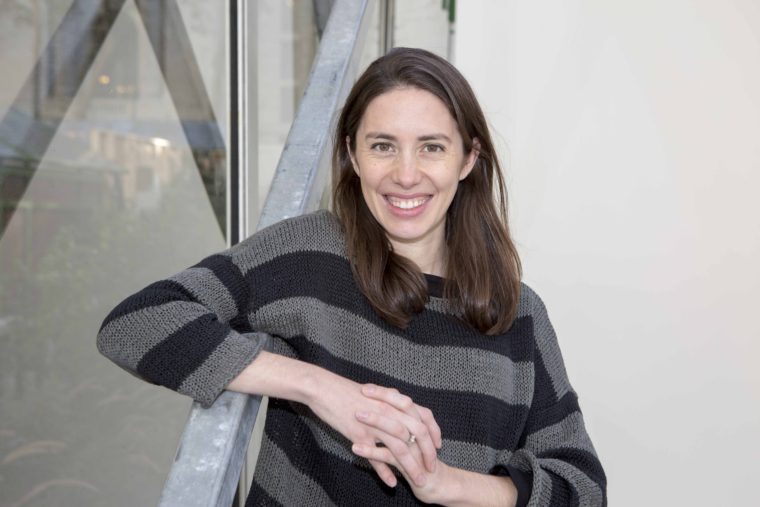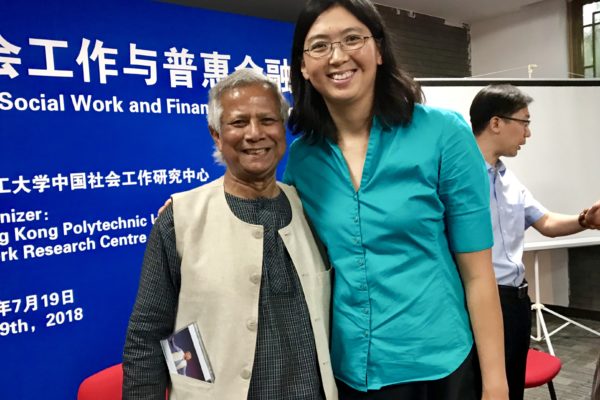At 24, Rebecca van Bergen, MSW ’06, founded Nest, a nonprofit that connects artisans to the commercial marketplace. Artisan craftwork is the second largest industry after agriculture in the developing world. Done primarily by women, and at home, craftwork is rife with exploitation, unsustainable practices and low pay. Nest works to alleviate these conditions by helping artisans establish relationships with reputable retailers, which provide many of these women with stable, well-paying work. Nest’s artisans — nearly 170,000 globally — typically see a 76 percent increase in income.
Not bad for an idea that started out on a cocktail napkin.
“I was struggling to decide what I wanted to do,” van Bergen says, “and I went to my favorite wine bar and wrote the attributes of my dream job on a cocktail napkin.” She was finishing up her master’s of social work degree at the Brown School, having entered graduate school to learn about international social work focused on women and children. And in 2006, the year van Bergen graduated, Muhammad Yunus won the Nobel Peace Prize for pioneering the idea of microfinance, making small loans to business owners too poor to qualify for bank loans.
“Microfinance seemed like an interesting model,” van Bergen says. “But it didn’t seem like there were many approaches that were more holistic and invested in training and infrastructure and market development.”
Nest would provide that more holistic model. Van Bergen developed a business plan and entered the Skandalaris Center’s Social Entrepreneurship and Innovation Competition, winning $24,000 in seed capital.
“In so many ways, Nest really was born through WashU,” van Bergen says. “The university feels close to my heart.”
With the seed money in hand, van Bergen enlisted the help of her family and started her company, forming a partnership with the Peace Corps to help her locate artisans and forging relationships with fashion companies to get them to hire artisans.
The company had its first big break when it partnered with FEED Projects, designer Lauren Bush Lauren’s company that helps feed children worldwide, to find artisans to create handbags.
“Once we had a successful partnership, it became easier to get others,” van Bergen says. “This still remains true. It’s word of mouth. Colleagues tell colleagues.”
Soon, van Bergen was traveling to New York so much that in 2009 she moved there. And over the years, she has refined the no-cost services Nest offers. Now, artisans who want to work with Nest fill out a survey about their business practices. Nest can then see what the artisans need to build their businesses and connect them with mentors. Artisans also go through a small-business development curriculum that includes learning about sustainable practices, quality control, recordkeeping, health and safety and more. Nest begins by providing remote help (Skype calls, webinars, an online library of trend reports), and artisans that remain engaged soon get on-site help from a network of industry volunteers that Nest has built.
Nest makes its money both through donations and by working with fashion brands such as West Elm, PVH, Eileen Fisher and Patagonia. Nest consults with companies about how to work with artisans and gives companies access to its vetted network of global artisans.
The idea hit a cord, and van Bergen has won fellowships, was named a CNN “Young Person Who Rocks,” has appeared on PBS’s Agents of Change and was featured in The New York Times. Nest was also honored by the White House as one of the Top 100 Entrepreneurial Enterprises led by a young person.
For van Bergen, though, the most important part of the mission is to see lives change. “Our mission is using craft employment as a way to empower women,” van Bergen says. “When women are able to earn income, they invest in their children. They become community leaders and community activists. At its root, all our work is about creating that ripple effect by empowering women to be able to work for
themselves.”



